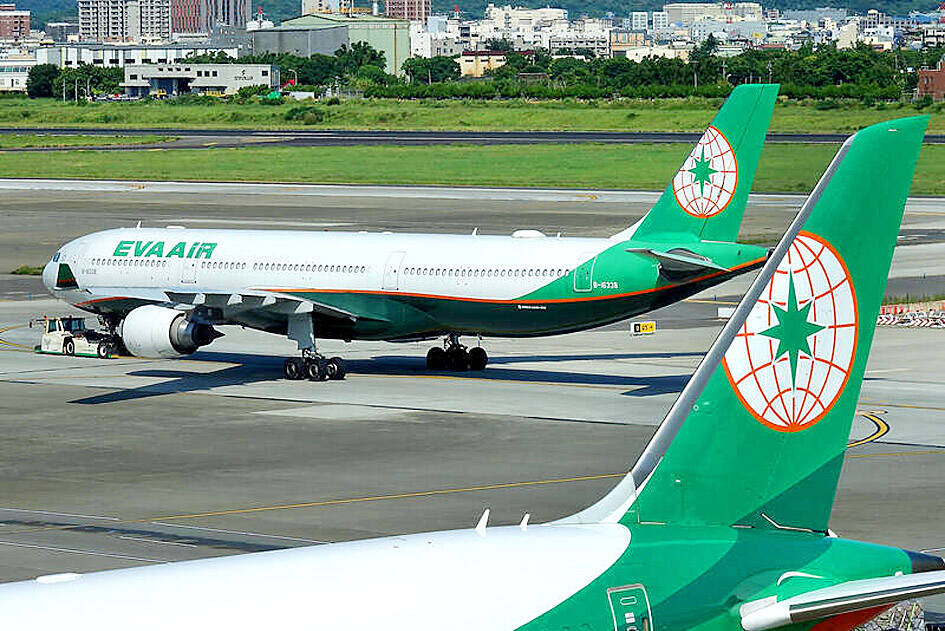Airbus SE said yesterday that Taiwan’s EVA Airways Corp (長榮航空) has finalized an order for 33 planes from the European aircraft maker, including 18 long-range A350-1000 planes and 15 single-aisle A321neo models.
Airbus did not provide a figure, but the deal could be worth as much as US$8.5 billion under catalog prices that the aerospace giant has not updated since 2018.
Airbus said that it has more than 1,000 firm orders from 60 customers worldwide for its A350 models. The wide-bodied A350-1000 type can seat up to 410 passengers and travel up to 18,000 kilometers non-stop.

Photo: Taipei Times file photo
“The A350 is setting new standards across the board in terms of range, payload, fuel efficiency and passenger comfort,” Airbus executive vice president for sales and commercial aircraft Benoit de Saint-Exupery said in a statement.
The A321neo, part of the A320neo family, has received more than 5,600 orders since its launch in 2016.
“In both size categories we have selected the most modern and fuel-efficient types, that offer the highest levels of passenger comfort,” EVA Airways president Clay Sun (孫嘉明) said in the Airbus statement. “The aircraft also bring significant reductions in carbon emissions, which is in line with our company’s sustainability goals.”
Founded in 1989, EVA Airways has a fleet of 86 planes. It carried 2.2 million passengers in 2022.
The airline serves 61 destinations over four continents, not including Africa, according to its Web site.

IN THE AIR: While most companies said they were committed to North American operations, some added that production and costs would depend on the outcome of a US trade probe Leading local contract electronics makers Wistron Corp (緯創), Quanta Computer Inc (廣達), Inventec Corp (英業達) and Compal Electronics Inc (仁寶) are to maintain their North American expansion plans, despite Washington’s 20 percent tariff on Taiwanese goods. Wistron said it has long maintained a presence in the US, while distributing production across Taiwan, North America, Southeast Asia and Europe. The company is in talks with customers to align capacity with their site preferences, a company official told the Taipei Times by telephone on Friday. The company is still in talks with clients over who would bear the tariff costs, with the outcome pending further

A proposed 100 percent tariff on chip imports announced by US President Donald Trump could shift more of Taiwan’s semiconductor production overseas, a Taiwan Institute of Economic Research (TIER) researcher said yesterday. Trump’s tariff policy will accelerate the global semiconductor industry’s pace to establish roots in the US, leading to higher supply chain costs and ultimately raising prices of consumer electronics and creating uncertainty for future market demand, Arisa Liu (劉佩真) at the institute’s Taiwan Industry Economics Database said in a telephone interview. Trump’s move signals his intention to "restore the glory of the US semiconductor industry," Liu noted, saying that

NEGOTIATIONS: Semiconductors play an outsized role in Taiwan’s industrial and economic development and are a major driver of the Taiwan-US trade imbalance With US President Donald Trump threatening to impose tariffs on semiconductors, Taiwan is expected to face a significant challenge, as information and communications technology (ICT) products account for more than 70 percent of its exports to the US, Chung-Hua Institution for Economic Research (CIER, 中華經濟研究院) president Lien Hsien-ming (連賢明) said on Friday. Compared with other countries, semiconductors play a disproportionately large role in Taiwan’s industrial and economic development, Lien said. As the sixth-largest contributor to the US trade deficit, Taiwan recorded a US$73.9 billion trade surplus with the US last year — up from US$47.8 billion in 2023 — driven by strong

STILL UNCLEAR: Several aspects of the policy still need to be clarified, such as whether the exemptions would expand to related products, PwC Taiwan warned The TAIEX surged yesterday, led by gains in Taiwan Semiconductor Manufacturing Co (TSMC, 台積電), after US President Donald Trump announced a sweeping 100 percent tariff on imported semiconductors — while exempting companies operating or building plants in the US, which includes TSMC. The benchmark index jumped 556.41 points, or 2.37 percent, to close at 24,003.77, breaching the 24,000-point level and hitting its highest close this year, Taiwan Stock Exchange (TWSE) data showed. TSMC rose NT$55, or 4.89 percent, to close at a record NT$1,180, as the company is already investing heavily in a multibillion-dollar plant in Arizona that led investors to assume